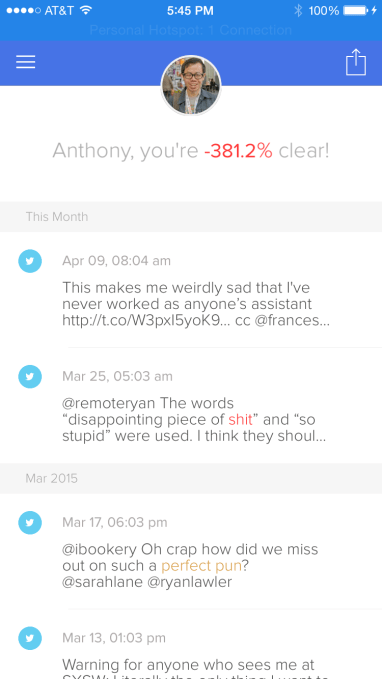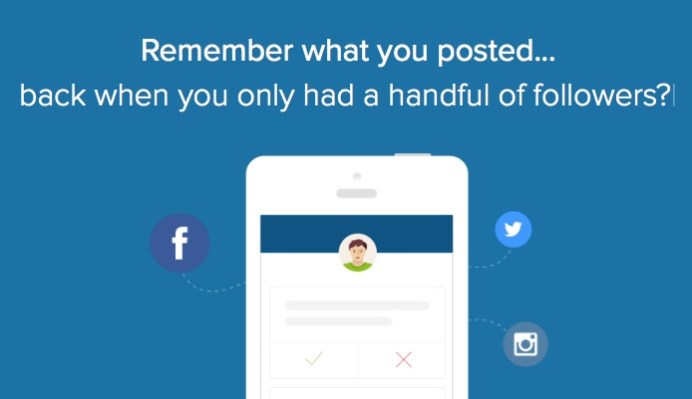Most of us have embarrassing stories about things we’ve shared on social media, but it’s hard to top Ethan Czahor‘s. He was hired as Jeb Bush’s chief technology officer, but shortly after he got the job, journalists uncovered some old offensive tweets and he had to resign.
Now Czahor is back in the tech world (before going into politics, he co-founded Hipster, which was acquired by TechCrunch-owner AOL, and he also worked at The Honest Company) with an iOS app called Clear that could help people in similar situations. Granted, chances are you’ll never even be in the running for the job of Jeb Bush’s CTO or, I dunno, the new host of The Daily Show, but old Facebook or Twitter posts can still make you look bad, either when you’re looking for a new position or when you’re about to start the new job.
If you don’t want people to get mad at you for horrible stuff you said on Twitter, isn’t the best solution to avoid saying horrible stuff on Twitter?
There’s currently a wait list for Clear (not to be confused with the to-do list app of the same name), but I got to jump the line and try it out for myself. I connected Clear to my Facebook and Twitter account, and after a few minutes of analysis, it gave me a score of … -381.2 percent. Which sounds pretty bad, but Czahor said the score is very much a “work in progress” — and hey, the lowest score so far is -2,404 percent.
 Clear also presents me with a stream of the most recent posts that set off its alarms. So yes, I guess I’ll occasionally throw some profanity into my tweets, but there were more surprising alerts, like tweets with words and phrases like “assistant” and “perfect pun.”
Clear also presents me with a stream of the most recent posts that set off its alarms. So yes, I guess I’ll occasionally throw some profanity into my tweets, but there were more surprising alerts, like tweets with words and phrases like “assistant” and “perfect pun.”
So, uh, the algorithm might need a little work (who gets offended by puns?!?) but Czahor said it’s not just trying to catch the obvious F-bombs and N-words. The app is also looking for warning signs like references to racial groups or sexual orientation, and it also analyzes the general sentiment. (Next up: Analyzing blog posts and visual content.) Then you have the option to decide which posts (if any) you want to delete.
This is definitely an early-stage product (Czahor said he just wanted to see how people responded before he started thinking too seriously about things like business models), so besides smaller quibbles, the bigger question is: Do we really want people to erase their past like this? Put another way: If you don’t want people to get mad at you for horrible stuff you said on Twitter, isn’t the best solution to avoid saying horrible stuff on Twitter?
Czahor said he understands that perspective, but he added, “Context is everything” — for example, the context that he was in an improv comedy group when he posted the tweets that got him in trouble, and they were meant to be “tongue in cheek,” with “no harmful intent.” (You may or may not feel like this excuses the tweets, but it does give them context.)
“I would agree that anything that’s obviously hateful or intolerant, you shouldn’t be able to hide in your past,” he said. “But if that exists in your heart, you won’t be able to hide it in your future.”
Anyway, Clear is taking advantage of deletion capabilities that already exist on these social networks — the app just makes it easier to find the stuff you might want to delete. Oh, and Clear won’t save you if other people find the controversial material first and take screenshots.
Anyway, I don’t plan to delete of those foul-mouthed tweets — somehow I’ve convinced myself that they’re charming or funny or whatever. But if this journalism thing falls through and I need to get a real job, I might have to reconsider …
